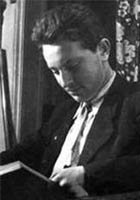Joseph Brodsky Biography
Joseph Brodsky was born in 1940, in Leningrad, and began writing poetry when he was eighteen. Anna Akhmatova soon recognized in the young poet the most gifted lyric voice of his generation. From March 1964 until November 1965, Brodsky lived in exile in the Arkhangelsk region of northern Russia; he had been sentenced to five years in exile at hard labor for "social parasitism," but did not serve out his term.
Four of Brodsky's poems were published in Leningrad anthologies in 1966 and 1967, but most of his work has appeared only in the West. He is a splendid poetic translator and has translated into Russian, among others, the English metaphysical poets, and the Polish emigre poet, Czeslaw Milosz. His own poetry has been translated into at least ten languages. Joseph Brodsky: Selected Poems was published by Penguin Books in London (1973), and by Harper & Row in New York (1974), translated by George L. Kline and with a foreword by W.H. Auden. A volume of Brodsky's selected poems translated in French has been published by Gallimard; a German translation, by Piper Verlag; and an Italian translation, by Mondadori and Adelphi. Farrar, Straus, and Giroux published Brodsky's acclaimed collection, A Part of Speech, in 1980.
On June 4, 1972, Joseph Brodsky became an involuntary exile from his native country. After brief stays in Vienna and London, he came to the United States. He has been Poet-in-Residence and Visiting Professor at the University of Michigan, Queens College, Smith College, Columbia University, and Cambridge University in England. He currently is Five College Professor of Literature at Mount Holyoke College. In 1978, Brodsky was awarded an honorary degree of Doctor of Letters at Yale University, and on May 23, 1979, he was inducted as a member of the American Academy and Institute of Arts and Letters. In 1981, Brodsky was a recipient of the John D. and Catherine T. MacArthur Foundation's award for his works of "genius".
In 1986, Farrar, Straus, and Giroux published Less Than One, a collection of Mr. Brodsky's essays on the arts and politics, which won the National Book Critic's Award for Criticism.
In 1988 Farrar, Straus, and Giroux published a collection of his poetry, To Urania, and in 1992 a collection of essays about Venice, Watermark.
I wish you were here, dear,
I wish you were here.
I wish you sat on the sofa
and I sat near.
...
I said fate plays a game without a score,
and who needs fish if you've got caviar?
The triumph of the Gothic style would come to pass
and turn you on--no need for coke, or grass.
...
Here's a girl from a dangerous town
She crops her dark hair short
so that less of her has to frown
when someone gets hurt.
...
A list of some observation. In a corner, it's warm.
A glance leaves an imprint on anything it's dwelt on.
Water is glass's most public form.
Man is more frightening than its skeleton.
...
...and when "the future" is uttered, swarms of mice
rush out of the Russian language and gnaw a piece
of ripened memory which is twice
as hole-ridden as real cheese.
...
